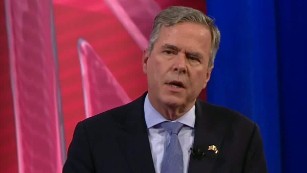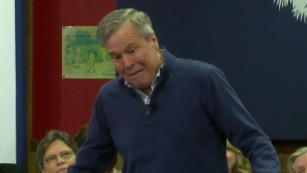Jeb Bush's doomed campaign
Jeb Bush always remained optimistic.
From the beginning of his candidacy last June, he pledged to run with "joy" and adopted a tortoise-and-the-hare strategy, earnestly believing that he would prevail in the end despite a crowded field of candidates.
Even as his chances became grim over the past eight months, he started handing out tiny toy turtles from his pockets to children, telling them that "slow and steady wins the race."
But in 2016, "slow and steady" was the opposite of what the country wanted.

Jeb Bush suspends campaign: What went wrong? 01:51
There's plenty of blame to go around for Bush's fall, but the central theme is the failure to read the mood of the GOP electorate that was angry and wanted change. Voters responded to Donald Trump, who Bush both underestimated and whose appeal he didn't understand.
Bush was out of practice on the campaign trail, something evidenced by his early stumbles answering questions on his stance on the war in Iraq -- a question that should have been anticipated with an answer ready. He declared early he was his "own man," but also highlighted his connection to his father and brother, presidents both. And he raised over $100 million between his campaign and super PAC, but it didn't scare anyone out of the race.
In the final few days before the South Carolina primary, Bush started to realize that his White House bid might be coming to an end. He talked with less certitude about moving on to other states and appeared almost wistful at times.

Jeb Bush: 'I would repeal Obamacare' 00:58
But it wasn't until late Saturday afternoon that he knew that he likely wouldn't be moving forward, according to campaign aides. Many staffers were told of his final decision just five minutes before he took the stage at the Hilton in Columbia.
"In this campaign I've stood my ground refusing to bend to the political winds," Bush said Saturday night. "We put forward detailed, innovative conservative plans to address the mounting challenges that we face. Because despite what you might have heard, ideas matter ... policy matters."
Bush spent much of his campaign focusing on his experience as governor of Florida and policy, consistently rolling out new initiatives and plans. But 2016 was simply a different era from the last time he ran for office -- in 2002.
Bush adviser Sally Bradshaw told CNN Saturday night that 2016 simply "was not his year."
"Look, this was a year that was bigger than a lot of the candidates in this race," Bradshaw said. Bush "didn't equivocate, and he took on Donald Trump and he showed us what is best about our party and what is best about our country."
As CNN's embedded reporter with the Bush campaign, I followed the former Florida governor from the lofty moments, early in 2015 when he was preparing for his presidential run, to the final days when he acknowledged that he would not be the third Bush to work in the Oval Office. I covered him at more than 100 events in 14 states over 11 months and this story is based on that experience.
On paper, an ideal candidate
Bush, who turned 63 last week, never placed above 18% as a candidate in the polls, but he remained the front-runner in the GOP field for the first month of his campaign.
He was a candidate who fulfilled what Republicans thought they needed after the 2012 election loss: an experienced governor from a swing state who could help expand the Republican base by appealing to Latinos and craft a narrative of a more compassionate party.
Jeb's 2016 departure draws out Mike Murphy critics
By the middle of the year, his campaign and allies at the super PAC Right to Rise USA, had raised more than $100 million, far more than any other candidate. The haul was meant to send the message that Bush could dominate the field and be a formidable general election candidate.
But instead, 2016 appeared to be the election no one said no to running. From Bush's one-time protégé from Florida Marco Rubio to Govs. Chris Christie, Bobby Jindal and Scott Walker and former Govs. Mike Huckabee and Rick Perry, Bush's cash scared no one. And it turned out to be for good reason.

Jeb Bush impersonates Donald Trump 00:41
Then, a perceived sideshow candidate named Donald Trump -- who labeled undocumented immigrants as "rapists" in his announcement speech -- stole the show. He started to gain traction and within weeks became not only the front-runner, but took the lead and ran away with it.
The surge revealed a Republican electorate that was more angry than joyful, surprising the Washington political class and upending the Republican primary narrative. With every insult hurled, Trump's anti-establishment, verbose persona became more popular. It was clear that Bush would face an uphill battle.
And Trump had his sights set on the former governor. He quickly began mocking Bush as an "unhappy person" with "low energy." Like many of the other candidates, Bush's campaign tried to stay above the fray and not engage with the reality TV star.
In Henderson, Nevada, in late July -- one of the first times Bush was asked to respond to Trump's "rapists" comment -- the candidate simply said: "I disagree with him." Pressed for more, he replied curtly: "I think he's wrong.
A couple of weeks later, in Carson City, Nevada, when Bush was asked if he wanted to respond to Trump accusing him of promising favors to his donors, Bush looked this reporter in the eye and said: "No."
Bush didn't start hitting back at Trump's accusations that Bush was "low energy" until mid-September, but by then it was too late. The label had stuck.
Aides, advisers and even Bush, himself, have quietly acknowledged that the popularity and influence of Trump was underestimated at the beginning.
"People probably thought they could just let (Trump's) comments go into the ether, not take the bait," one adviser said. "This campaign probably felt for some time that it was best to let Trump hang out there and make a fool of himself."
8 takeaways from South Carolina and Nevada
Messages didn't stick
Bush, from the start, had high name recognition, but the campaign felt that people didn't know his conservative record as the two-term governor of Florida.
But those messages couldn't drown out the barrage of attacks coming his way from Trump, especially the "low energy" brand that quickly became the meme of Bush's candidacy.
"I believe it hurt a lot," the adviser said.

The 2016 race, Obama's legacy, congressional gridlock — get the most important political news delivered to your inbox. By subscribing, you agree to our privacy policy.
It was especially frustrating for the campaign because, Bush, in fact, was anything but low energy. He campaigned tirelessly from the start of his bid and voters were routinely impressed and surprised by his passion when they saw him at his town halls.
But, having been out of campaign politics for more than a decade, Bush struggled early on to command the stage at debates and appeared awkward on TV, versus the looser, comfortable-in-his-own skin Bush that voters saw in person.
Over that time, Bush gradually stepped up his attacks against Trump, and at a debate in December, Bush tore into the front-runner repeatedly, solidifying himself as the "anti-Trump" candidate. Trump's locker-room language irritated Bush so much that the former governor started calling Trump a "loser" and a "jerk," and painted him as a disparager of Hispanics, women, people with disabilities and prisoners of war.
News COurtesy: www.cnn.com











